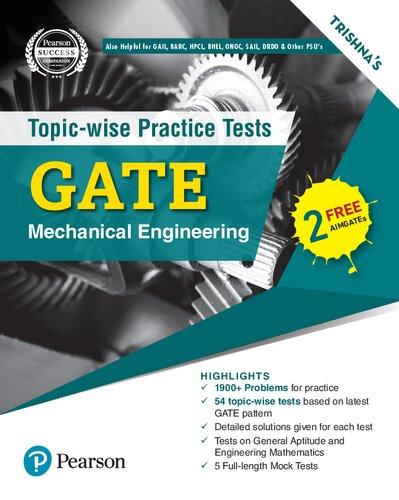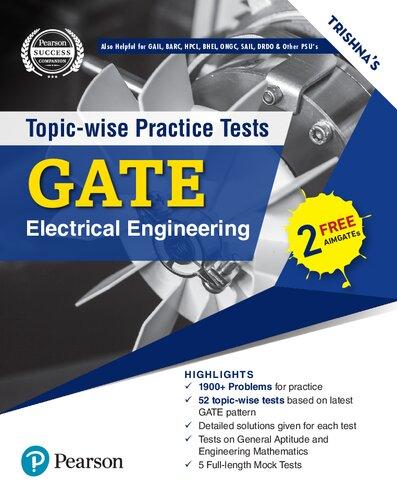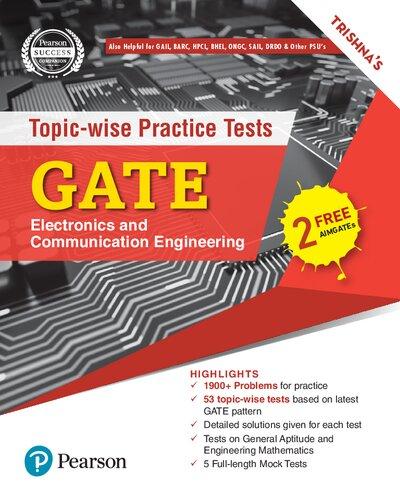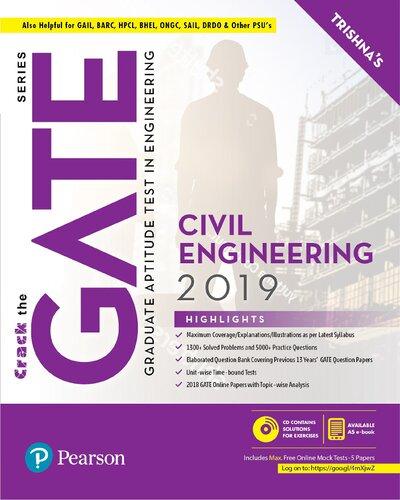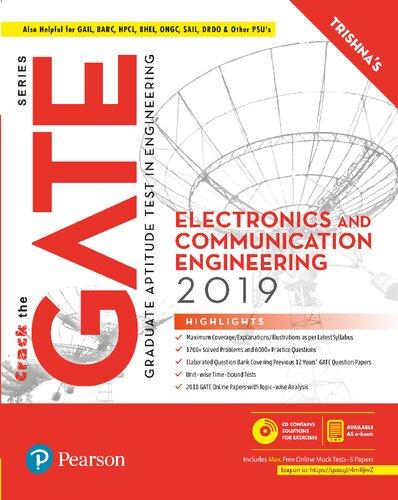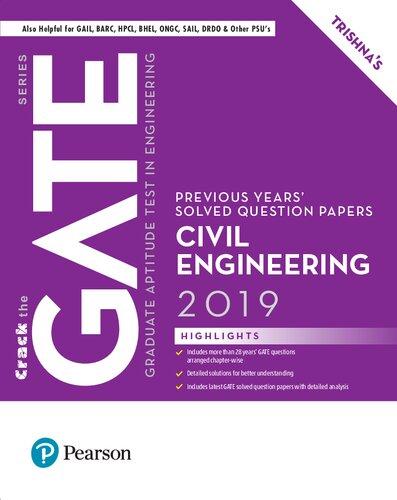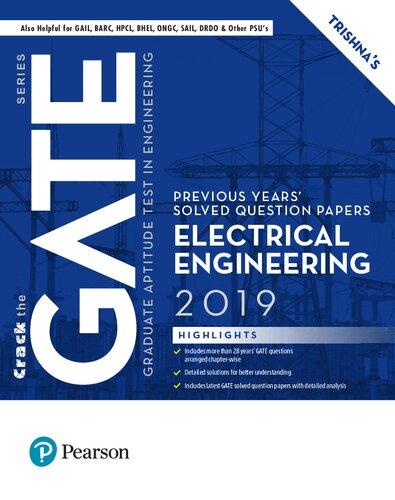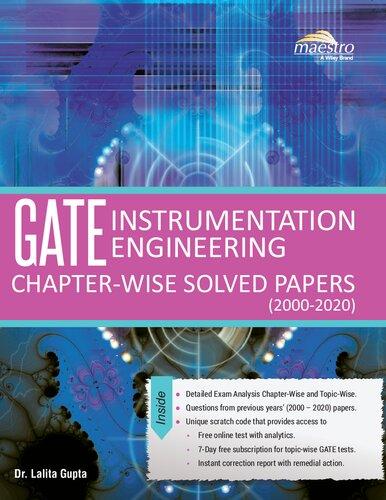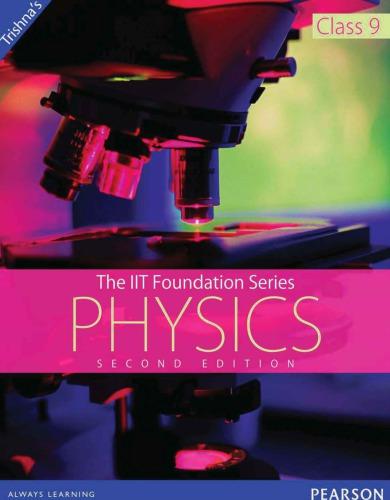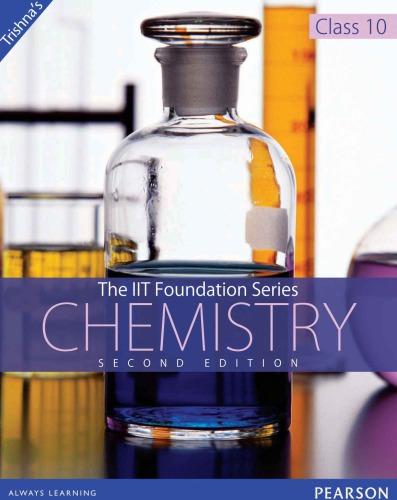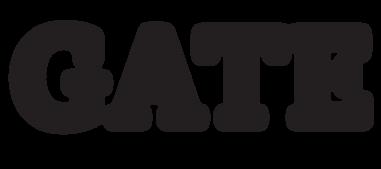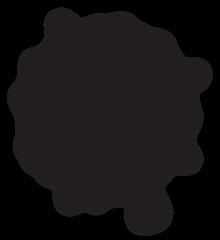Verbal abIlIty teSt
This page is intentionally left blank
Verbal Ability Test 1
Number of Questions: 40 Time: 30 min
Directions for questions 1 to 5: Each of the given sentences has four underlined parts. One of them has a mistake. Mark the number of the wrong part as answer.
1� In the Sub-Saharan countries incidences of (A) Sunstrokes correlates positively withthe level of (B) (C) Solar radiation. (D)
2� Either you transfer the data which was demanded (A) (B) nor file a report explaining why you did not (C) submit the overall annual figures. (D)
3� Neither the judge nor I am ready toannounce (A) (B) (C) who the winner is. (D)
4� He went about the bad phase in his career with (A) (B) (C) philosophical clam (D)
5� A score of apple is purchased by him (A) (B) (C) for his consumption. (D)
Directions for questions 6 to 10: Read each sentence to find out whether there is any error in it. The error, if any, will be in one part of the sentence. Identify the error and mark the number of the erroneous part as your answer.
6� All the members / of the club / was present / (A) (B) (C) at the special meeting. (D)
7� Over the course of the twentieth century/ (A) the internal combustion engine / (B) has replaced the horse / to the basic means of transport. (C) (D)
8� We must / never give up with /trying to enhance/ (A) (B) (C) the quality of life. (D)
9� It will profit a man nothing / if he was / (A) (B) to gain the world / and lose his own soul. (C) (D)
10� Injustice and discrimination / can never be / (A) (B) tolerated by / no one. (C) (D)
11� Alas! / How lovely / and fragrant / (A) (B) (C) these flowers are! (D)
12� Your story is / so ridiculous that / it could not/ (A) (B) (C) be believed. (D)
13� Government schools / has too many students / (A) (B) in a class / for a teacher to control. (C) (D)
14� Either of / the methods / lead to the / (A) (B) (C) same result. (D)
15� The doctor has / advised him / to avoid the sugar / (A) (B) (C) in his milk. (D)
Directions for questions 16 to 20: Each sentence given below is divided into four parts. One of them has an error. Mark the number of the incorrect part as your answer.
16. The church accepts this popular sentiment / (A) gives it a religious significance /and crystallizes / (B) (C) in a system (D)
17� The government of the Tudors / (A) were masters in the art of disguising / (B) common place, and sometimes sordid, motives / (C) beneath a glittering façade of imposing principles. (D)
18� The increasing reluctance of the sun to rise,/ (A) the extra nip in the breeze / (B) the patten of shed leaves dropping - all the evidences of fall / (C) drifting in winter were clearer each day. (D)
19� Because of it’s hardness / this steel is / used principally/ (A) (B) (C) for making razors. (D)
20 Laying aside all hindrance / (A) thrusting away all private aims / (B) devote yourself unswerving and unflinchingly / (C) to the vigorous and successful prosecution of this war (D)
Directions for questions 21 to 25: In each question below, two sentences are given. These two sentences are to be combined into a single sentence without changing their meaning. Three probable starters of the combined sentence are given which are denoted by (A), (B) and (C). Any one or more or none of them may be correct. Find out the correct starters(s) and accordingly select your answer from among the given five answer choices.
21� I am a layman. I do not know how a computer works.
(A) Being a layman, I ………..
(B) As I am a layman, I ……….
(C) While I am a layman, I……..
(A) A and B (B) B and C
(C) A and C (D) B only
(E) A only
22� He always listened to good advice. He rose to a good position in life.
(A) Though he listened to good advice ……..
(B) As he rose to good position in life ……..
(C) Since he listened to good advice …….
(A) A and B (B) B and C
(C) A only (D) B only
(E) C only
23� The soldiers saw the camp of the enemy. They started attacking the enemy.
(A) While the soldiers saw the enemy camp ……
(B) When the soldiers saw the camp …….
(C) Because the soldiers saw the camp …….
(A) B and C (B) A and C
(C) B only (D) A only
(E) C only
24� The weather is warm. I like to go for swimming now.
(A) If the weather is …………
(B) Whenever the weather is ………
(C) As the weather is …….
(A) A and B (B) A only
(C) B only (D) C only
(E) None of these
25� We cannot achieve our goals. We lack confidence in our abilities.
(A). When we lack confidence ………..
(B) However we can achieve our goals if we lack …..
(C) Whenever we achieve our goals ………
(A) A and B (B) A only
(C) B only (D) C only
(E) B and C
Directions for questions 26 to 30: Each sentence has a missing part. Choose the best option from those given below the statement to make up the missing part.
26� Given the long and porous border between the two countries and, more important, the links _______.
(A) among Nepalese and Indian rebel groups, New Delhi cannot afford ignoring the Maoists threat of Nepal
(B) between Nepalese and Indian rebel groups, New Delhi cannot afford the ignorance of the Maoists threat in Nepal
(C) among Nepalese and Indian rebel groups, New Delhi cannot afford to ignore the Maoists threat of Nepal
(D) between Nepalese and Indian rebel groups, New Delhi cannot afford to ignore the Maoists threat in Nepal
27� At a time when Beijing’s officially scripted anti-Japanese protests are bound to prompt a rethink in Japan about the advisability of continued investment in China, India should be __________.
(A) persuading aggressively Japanese business to shifting at least some of their mammoth investments to its secure location
(B) aggressively persuading Japanese business to shifting at least some of their mammoth investments to its secure location
(C) aggressively persuading Japanese business to shift at least some of their mammoth investments to its secure location
(D) persuading aggressively Japanese business to shift at least some of their mammoth investments to its secure location
28� ________, that they could compete successfully, even with the higher techniques of production, which were being established in England.
(A) So efficient and highly organized were Indian methods of production, and such was the skill of India’s artisans and craftsmen
(B) So efficiently and highly organized were Indian methods of production, and such were the skill of India’s artisans and craftsmen
(C) So efficient and highly organized were Indian methods of production, and such was the skill of India’s artisan and craftsman
(D) So efficiently and highly organized were Indian methods of production, and such were the skill of India’s artisan and craftsman
Directions for questions 29 to 33: In the following questions, two sentences are given. There may be an error in the sentence(s). Mark as your answer
(A) if there is an error only in the first sentence; (B) if there is an error only in the second sentence; (C) if there are errors in both the sentences and (D) if there is no error in either of the two sentences.
29� I He said that he will come, but he didn’t.
II I admit, ‘No news is good news now - a -days’.
30� I I and my friend like to play tennis in grass court.
II Each of the mistakes have to be corrected before printing.
31� I I cannot see anything wrong with the plan.
II. You may read the book if you have enough time.
32� I There is a little truth in what we have heard.
II. You are not going to the theatre, isn’t it?
33� I. He informed me before he had posted the letter yesterday.
II No one is as happy as he.
Directions for questions 34 to 40: A sentence is given in four different forms. Only one of them is correct grammatically. Mark the number of the correct one as the answer.
34� (A) My sister likes painting, dancing and to cooking.
(B) My sister likes painting, dancing and to cook.
(C) My sister like painting, dancing and cooking.
(D) My sister likes painting, dancing and cooking.
35� (A) If you want to play well, you must practise. (B) If you want to play well, one must practise.
(C) If one want to play well, you must practise. (D) If one wants to play well, he must practise.
36� (A) Einstein was more cleverer than any other scientist. (B) Einstein was more cleverer than any scientist.
(C) Einstein was cleverer than any other scientist. (D) Einstein was cleverer than any scientist.
37� (A) An argument developed among his sister and him.
(B) An argument developed between his sister and he.
(C) An argument developed between his sister and his. (D) An argument developed between his sister and him.
38� (A) The youngster will benefit from the experience. (B) The youngster will benefit by the experience.
(C) The youngster will benefit of the experience.
(D) The youngster will benefit out of the experience.
39� (A) There were lesser children in the class than expected.
(B) There were fewer children in the class than expected.
(C) There were a little children in the class than expected.
(D) There were a small children in the class than expected.
40� (A) The child can’t hardly wait till its birthday.
(B) The child can wait till it’s birthday.
(C) The child can hardly wait till its birthday.
(D) The child can wait hardly till its birthday.
Hints and Explanations
1. Indences correlate. Choice (B)
2. ‘Nor’ must be replaced by ‘or’. Choice (C)
3. ‘Who the winner is’ is redundeant. Use only ‘the winner’. Choice (D)
4. ‘Went about’ is the wrong phrase in the context of the given sentence. Choice (A)
5� “A score of apples’ is the correct phrase, as ‘score’ means twenty or a set of twenty. Choice (A)
6� Choice (C)
7� Choice (D)
8� Choice (B)
9� Choice (B)
10� Choice (D)
11� Choice (A)
12� Choice (C)
13� Choice (B)
14 Choice (C)
15 Choice (C)
16 The third part of the sentence should be ‘and crystallizes it’. Crystallizes is a verb which takes an object. Choice (C)
17 Part 2 of the sentence is faulty as the preposition used should be ‘of’ and not ‘in’. One is the ‘master of the art’ not in the art. Choice (B)
Answer Keys
18 The fourth part of the sentence is faulty, as ‘drifting into winter’ is correct - it indicates motion. ‘In’ does not indicate motion. Choice (D)
19 In the first part of the sentence ‘its’ is in the genitive case, so there need not be an apostrophe, ‘Because of its hardness’ is correct. Choice (A)
27� The adverb ‘aggressively’ qualifies ‘persuading’ and hence must precede it (rules out choices 1 and 4). Choice 2 is wrong because ‘to shifting’ is incorrect.
Choice (C)
20. The third part of the sentence should read ‘devote yourself unswervingly and unflinchingly’ to maintain parallelism in construction.
Choice (C)
21. The two sentences can be combined into a simple sentence by changing the verb ‘am’ into ‘v + ing’ (i.e.) ‘being’. Hence ‘A’ is possible. The conjunction ‘as’ also can be used, as it shows reason. But ‘C’ cannot be used as the sentence cannot be combined with the conjunction ‘while’.
28� Since the verb at the beginning of the sentence is ‘were’ (plural) it must be ‘efficient and highly organized’. If it were ‘efficiently’ then both (efficiently and highly) qualify ‘organized’ and the verb would be was (rules out 2 and 4). We are talking of artisans and craftsmen (plural again not singular) Choice (A)
29� The past tense should be used. The first sentence should be “He said that he would come, but he didn’t”.
Choice (A)
Choice (A)
22 The sentence donates a positive meaning. Hence it cannot begin with ‘though’. The conjunction ‘as’ and ‘since’ can begin the sentence. But here ‘B’ begins with the second sentence which changes the meaning of the given sentence.
30� The second person must come first. Statement 1 should be “My friend and I like to play tennis on grass court.”
Statement 2 Each of the mistakes has to be corrected before printing. Choice (C)
31� No error in both the sentences. Choice (D)
Choice (E)
32� You are not going to the theatre, are you? Choice (B)
33� He informed me before he posted the letter yesterday.
Choice (A)
Choice (C)
23 The sentences cannot give the same meaning if the conjunctions ‘while’ or ‘because’ are used. It shows a particular time and hence ‘when’ would be the right way to begin the sentence.
24 ‘If’ or ‘whenever’ can also begin the sentence. But here it is not a general statement. It specifies that particular time as ‘now’ is used. Hence ‘as’ is the most appropriate way to begin this sentence.
34� The gerund form should be maintained throughout a sentence. Choice (D)
Choice (D)
25. The sentence is about ‘not achieving’. ‘B’ and ‘C’ talk about ‘achieving’ and hence cannot be appropriate.
Choice (B)
Solutions for questions 26 to 28:
26. ‘Between’ is better than ‘among’ since only two – the Indian and Nepalese – rebel groups are mentioned. (Between is used for two or more, among for three or more). We are talking of the threat in Nepal not of Nepal. New Delhi cannot ignore (disregard intentionally) not ignorance (lacking knowledge). Choice (D)
35� ‘You’ must be followed by ‘you’. ‘One’ must be followed ‘one’. Therefore, Choice (A) is right and the other choices are incorrect. Choice (A)
36� ……. Cleverer than any other……… Choice (C)
37� ‘Between’ should be followed by the objective case ‘him’ and not the subjective case ‘he’. Choice (D)
38� You benefit from something. Correct preposition. Choice (A)
39� In case of numbers we use ‘fewer’. ‘Less/Lesser’ are used in the case of weight and ‘little/small’ in the case of size. Choice (B)
40� ‘Hardly’ indicates ‘cannot’. So, ‘the child cannot wait for its birthday’ is being intended. Choice (C)
Number of Questions: 40
Verbal Ability Test 2
Directions for questions 1 to 5: In each of the following questions, 3 words are related in some way. Find the “odd man” out.
1. (A) Expert (B) Professional (C) Civilized (D) Maestro
2. (A) Blue (B) Crimson (C) Ruby (D) Scarlet
3. (A) Commentary (B) Critique (C) Authority (D) Review
4. (A) Decahedron (B) Decade (C) Decagon (D) Decibel
5. (A) Grave (B) Coffin (C) Tomb (D) Monument
Directions for questions 6 to 15: In each question given below, identify the word which is similar in meaning (synonym) to the question word.
6. ABATE
(A) improve (B) decrease (C) subside (D) sharpen (E) sweep
7. RENOUNCE
(A) relinquish (B) withdraw (C) forgive (D) punish (E) accept
8. ABDUCT
(A) ransack (B) surround (C) induce (D) destroy (E) kidnap
9. DETEST
(A) hate (B) rebel (C) neglect (D) pretend (E) captivate
10. CLEANSE
(A) polish (B) flow (C) absolve (D) reveal (E) revolve
11 ABODE
(A) sanctuary (B) residence (C) reformatory (D) dwelling (E) shelter
12. RESCIND
(A) withhold (B) countermand (C) hamper (D) suppress (E) encroach
13 EPITOMIZE
(A) disappoint (B) distend (C) exemplify (D) generate (E) lengthen
14. REPEAL
Time: 30 min
(A) continue (B) prolong (C) promote (D) reject (E) abrogate
15. ABSCOND
(A) run away (B) give away (C) move away (D) forbid (E) waste away
Directions for questions 16 to 25: In each of the questions given below, identify the word which is opposite (antonym) in meaning to the question word.
16. FUSION
(A) union (B) participation (C) isolation (D) marriage (E) gloom
17. SOMNOLENT
(A) drowsy (B) lively (C) cheerful (D) joyous (E) active
18. MELLIFLUOUS
(A) harmonious (B) pitchable (C) discordant (D) internal (E) external
19. PRODIGAL
(A) generous (B) revisable (C) frugal (D) pauper (E) rich
20. DISASTER (A) puzzle (B) success (C) omen (D) festival (E) fiasco
21. ANIMATE (A) truthful (B) false (C) active (D) dull (E) lazy
22. WRETCHED (A) filthy (B) tidy (C) neat (D) clear (E) scenic
23. SQUANDER (A) waste (B) liberate (C) presume (D) donate (E) economize
24. PERTURBED
(A) servable (B) controllable (C) composed (D) decided (E) resolved
25. SLUGGISH
(A) lethargic (B) indolent (C) apathetic (D) intelligent (E) exuberant
Directions for questions 26 to 29: In each of the following questions, an idiomatic expression and its five possible meanings are given. Pick out the correct meaning of the idiomatic expression and mark the number of that meaning as your answer.
26 To be on the fiddle (A) to work on something important (B) to be doing something dishonest to get money (C) to constantly find fault with others (D) to have a less important position than somebody or something else alive (E) to always keep oneself busy
27. As the crow flies (A) in a very swift manner (B) in a straight line (C) in a very precise manner (D) very short distance away (E) in a clumsy way
28. In a melting pot (A) in a very difficult situation (B) to take an important decision (C) to be prone to bad influences (D) in a helpless situation (E) in the process of changing
29. To open somebody’s eyes (A) to keep a watch on someone (B) to be more observant and quick to notice things (C) to refuse to listen to others (D) to become close or friendly with someone (E) to make someone realize or understand something
Directions for questions 30 to 34: In each question, a sentence is given with an idiom (underlined). Four possible meanings of the idiom are also given. Identify the correct meaning and mark the number of the correct choice as answer.
30. The officer was guilty of sharp practices and so he was dismissed.
(A) angry behaviour (B) disobeying (C) questionable dealings. (D) constant quarrel
31. We were kept on tenterhooks while the judges were deciding the winners.
(A) in anxiety (B) in trouble (C) on the bridge (D) in the witness box
32. The dispute among the students came to a head and the principal declared a holiday. (A) came to one man’s decision (B) reached a crisis (C) did not stop (D) started all over again
33. After getting a job he had no difficulty in keeping the wolf out of the door.
(A) being physically safe (B) getting the door clear (C) avoiding starvation (D) keeping the job intact
34. He asked me not to thrust my nose into his affairs. (A) smell anything wrong (B) meddle officiously (C) forget (D) combine
Directions for questions 35 to 40: In each of the following questions four numbered choices are given. Three of them belong to the same category. Mark the number of the ‘odd man’ as your answer.
35. (A) Parents (B) Love (C) Guidance (D) Punishment
36. (A) Periphery (B) Perfunctory (C) Cursory (D) Superficial
37. (A) Prune (B) Abridge (C) Trim (D) Spruce
38. (A) Overfly (B) Overeat (C) Overdressed (D) Overdose
39. (A) Serendipity (B) Fortuity (C) Guess (D) Coincidence
40. (A) Vague (B) Abstract (C) Intangible (D) Empirical
Answer Keys
Hints and Explanations
1. Expert, professional and maestro talk about the skill or knowledge of a person; ‘civilised’ talks about the behaviour of a person.
2. Crimson, ruby and scarlet are shades of red.
Choice (C)
Choice (A)
3. Commentary, critique, review refer to the expression of opinion.
Choice (C)
4. Choices 1, 2 and 3 are related to ‘ten’ (ie) ‘deca’. In ‘decibel’, ‘deci’ means one-tenth.
5. Grave, tomb and coffin are related to death.
Choice (D)
Choice (D)
6. The words abate and decrease are synonymous.
Choice (B)
7. The word relinquish is synonymous with renounce (give up, discard).
Choice (A)
8. Abduct and kidnap are synonymous. Choice (E)
9. Detest means to loathe or hate.
Choice (A)
10. Cleanse (rid of something unpleasant or unwanted) is synonymous with absolve (declare free from guilt, blame or sin).
Choice (C)
11. The word abode which is a formal or literary term means a house or home, ‘dwelling’ is its closest synonym. The word ‘residence’ can be ruled out because it refers only to a person’s home, whereas the word ‘abode’ has a wider connotation. For eg. the abode of animals, the abode of god but it is absurd to say the residence of god or the residence of animals.
Choice (D)
12. Rescind means to cancel (a law, order or agreement) the word countermand, which also the means the same, is its synonym.
Choice (B)
13. The word epitomize means to be a perfect example of. The word ‘exemplify’ is its closest synonym.
Choice (C)
14. Repeal means to officially cancel (a law of act of parliament) the word ‘abrogate’ also means the same.
Choice (E)
15. Abscond means to leave quickly and secretly to escape from custody or avoid arrest.
Choice (A)
16. Fusion (the process of joining two or more things to form a whole) and isolation are antonymous.
Choice (C)
17. Active (alert) is an antonym of somnolent (sleepy; drowsy).
Choice (E)
18. The word mellifluous means pleasingly smooth or musical to hear. The word discordant (cacophonous, harsh) is its antonym.
Choice (C)
19. Prodigal (wasteful, extravagant) and frugal (thrifty, economical) are antonyms.
Choice (C)
20. Success is an antonym of the word disaster which also means failure.
Choice (B)
21. Animate (alive) and dull are antonyms. Choice (D)
22. The words wretched (miserable) and tidy are antonyms.
Choice (B)
23. Squander means to waste (money, time, etc) in a reckless or foolish way. Economize is its antonym.
Choice (E)
24. Composed (calm) is an antonym of the word perturbed (alarmed).
Choice (C)
25. Exuberant (lively, cheerful) and sluggish (inactive) are antonyms.
Choice (E)
26. “To be on the fiddle” means doing something dishonest to get money. Choice (B)
27. The idiom, ‘as the crow flies’ means ‘in a straight line’. Choice (B)
28. The idiom, ‘in a melting pot’ means ‘in the process of changing’. Choice (E)
29. ‘To open somebody’s eyes’ is to cause or make someone realize or understand something. Choice (E)
30. Choice (C)
31. Choice (A)
32. Choice (B)
33. Choice (C)
34. Choice (B)
35. Parents are not concepts as the other three are. Choice (A)
36. Periphery. The other three are associated with casual attitude. Choice (A)
37. The first three refer to cutting short. Choice (D)
38. Overfly is to fly above a place. In all the other three over has the meaning of excessive. Choice (A)
39. Guess. The others refers to a favourable chance. Choice (C)
40. Empirical is verifiable the others are not. Choice (D)
Verbal Ability Test 3
Number of Questions: 40 Time: 30 min
Directions for questions 1 to 10: In each question the word at the top is used in four different ways. Select the option in which the usage of the word is INCORRECT or INAPPROPRIATE.
1. COMMUNICATE
A. The deaf and dumb communicate by means of sign language.
B. The excitement was palpable and communicated itself to the crowd.
C. People living in the suburbs have to communicate a long distance every day.
D. A contagious disease is communicated through physical contact.
2. OPPOSITE
A. Being an adolescent, Mrinal felt shy talking to members of the opposite sex.
B. I expected the bride to be shy and quiet, but she was just the opposite.
C. The Raos live further down, on the opposite side of the road.
D. The bank is opposite to the supermarket.
3. RAW
A. Dostovsky’s novels often portray life in the raw.
B. Women labourers often get raw deal from contractors.
C. Her own experiences provided the raw material for her first novel.
D. Being marooned on the island forced them to eat raw meat.
4. PICTURE
A. There have been a number of changes recently - let me put you in picture.
B. Atticus always told the old lady that she looked a picture.
C. Ever since he went into pictures the couple have been drifting apart.
D. From the reports, the picture for the service sector is encouraging.
5. MASTER
A. Vivek realised that he was expected to master Japanese before leaving for Japan.
B. Tilak has a masters in Business Administration.
C. The master bedroom was spacious and comfortable.
D. “Don’t be led by others, be your own master,” Sampath said severely.
6. CLOSE
A. The soldiers advanced in a close formation.
B. Over the next few months we have to keep a close eye on sales.
C. Alind closed down in the nineties.
D. The police often close ranks when one of their officers is accused.
7. BACKGROUND
A. The name ‘TIME’ is written in red on a white background.
B. The film has good background music by Rehman.
C. The elections in Sri Lanka took place on a background of violence.
D. The Director asked for more background on the company’s financial position.
8. DEFENCE
A. Whenever Roja was criticized, her brother leapt to her defence.
B. Why don’t you give a chance for the body’s natural defence mechanism to protect it?
C. No cost is too high when it is for the defence of the country.
D. News of an imminent attack forced the troops onto the defence.
9. CHANGE
A. The property changed hands several times in the last decade.
B. Expecting a change of heart from that stubborn mule is useless.
C. Some of my old dresses will have to be changed to fit me now.
D. Marriage has changed Sania for better.
10. EARTH
A. Yasho was the happiest person on earth when she won the gold medal.
B. Aditya flung his bike on the earth and rushed inside when he saw smoke emanating form the house.
C. The good earth always gives back several times what you put in.
D. Be sure to earth household electrical gadgets so that they are safe to handle.
Directions for questions 11 to 20: In each of the following questions, a paragraph with a ‘blank’ is given. From the four choices, select the sentence, which can go into the blank to make the paragraph logically coherent.
11. India has the distinction of becoming a country with a billion people. Thus, it becomes the second largest populated country in the world. (____)
(A) The global population has almost touched the six billion mark.
(B) Statistically speaking, every sixth person in the world is an Indian.
(C) Forced population control is not desirable.
(D) It is difficult to judge how many forests have been encroached upon.
12. In the armed forces, before independence, Muslims constituted around 35 percent of the total strength.
(____) Why so few Muslims?
(A) Most of them were recruited from Punjab and nearby areas.
(B) Today, it has gone down to just a mere two percent out of a total close to a million.
(C) This is basically due to a lack of lobby.
(D) This can be attributed to a change in human behaviour.
13. It would be a Herculean task to remodel our settlements to keep them clean through proper waste disposal systems. As such we have already realized that, recycling of waste liquids and solids would be a saner approach. (____)
(A) Now we are very used to human interference with nature.
(B) We may not be able to survive utilising the available resources.
(C) But organising such measures will involve considerable time, effort, management and education.
(D) Many of our organisation lack this foresight.
14. When a bird hits an aircraft, it can cause potentially catastrophic damage. (____) So a team at Britain’s Defence Evaluation and Research Agency plans to use crystals that glow when fractured to warn of such unseen damage.
(A) This makes visual inspection of damage unreliable.
(B) This is one of the greatest dangers of information technology.
(C) This is the ease with which communication goes on these days.
(D) But in planes made of carbon composites, such damage may be impossible to spot.
15. The General Electric Company is setting up India’s first multi-disciplinary research centre. (____) It will contribute to the development of multi-disciplinary engineering capabilities in India.
(A) Named the GE India Technology centre, it is also the largest of its kind.
(B) It plans to recruit 500 research scientists.
(C) This will help develop GE’s global business.
(D) The project will be over by December, 2000.
16. One major change in careers is that one can work from
home. (_____) So far, only work relating to Information Technology has been thus affected. It is expected that many other careers will afford this flexibility in the future.
(A) Therefore one should develop a confident, outgoing personality.
(B) There is no such thing as a permanent job.
(C) New technologies ensure that geographical distance is not a hindrance to one’s work.
(D) While it is true that people will switch jobs faster than ever before, one must be loyal to one’s organisation.
17. (____) There are several cave paintings, stone engravings and carved figures which bear this out. The Neanderthal man attempted this too, but his drawings of the tools he used show that they were rather crude.
(A) Prehistoric man used sophisticated tools for drawing and carving figures.
(B) The Cro-Magnon man, who was the forerunner of modern man, earned his daily bread through paintings.
(C) The Cro-Magnon man, who was the forerunner of modern man, was the first fine artist in the history of man’s evolution.
(D) Prehistoric man pursued painting and carving figures as a hobby.
18. The natural atmosphere which man has inherited from the past, has been deteriorating under the impact of industrialization. Factories pump millions of tons of dust into the air, vehicles spread fumes and sprays are used to kill agricultural pests – all combine to change the ideal picture. (____) The situation near big cities and heavily industrialized areas has become particularly bad, and the air is not fit for breathing.
(A) Movement of vehicular traffic on the roads should be restricted.
(B) The pollution of air has become a matter of great concern because it continues to increase as civilization spreads.
(C) Society will have to move towards stricter pollution control.
(D) The atmosphere should be protected as it is a great and irreplaceable resource for living.
19. In recent times, the number of working women has increased considerably in urban areas. With more and more women opting for career-oriented courses, offices and business establishments are flooded with applications from qualified women. (____) Women are working side by side with men in all walks of life.
(A) A working woman’s life is not a bed of roses.
(B) In fact, there are very few workplaces today which do not have single women.
(C) It is possible to maintain a good standard of living only if the woman contributes to the family income.
(D) Even in small towns and villages, most women are employed.
20. For several thousands of years, the moon has been the only satellite of the earth. Today, however, the earth has many other satellites – all made by man. (____) However, some of them will still be going around the earth thousands of years from now.
(A) Artificial satellites do not fall because they are not affected by earth’s gravity.
(B) They travel in an orbit around the earth.
(C) As they speed along, they tend to go straight off into space.
(D) These artificial satellites are very much smaller than the moon.
Directions for questions 21 to 30: In the following passage there are blanks, each of which has been numbered. These numbers are printed below the passage and against each, five words are suggested, one of which fits the blank appropriately. Find the appropriate word in each case and mark its number as your answer.
In most developed and developing nations, the illicit trade in live wild animals is (21) . Each year millions of (22) are wrenched from their natural habitats by people (23) to make quick money, then routed through a ragtag chain of middlemen and international dealers to meet the (24) demand of private collectors in Saudi Arabia, pet shops in Germany, Japan and the U.S.; zoos and circuses in Eastern Europe and folk healers in Asia. According to a wildlife expert, it is the third biggest (25) business, after drugs and arms.
Though many exotic species can be purchased (26) trade in animals and birds that are in (27) danger of extinction is (28) under the United Nations Convention on International Trade in Endangered Species (CITES), which has been signed by 120 nations. The treaty also regulates trade in other species that are seriously threatened, but its provisions are widely (29) , even in signatory countries. Tigers have all but (30) from China and are fast disappearing from India and Siberia.
21. (A) diminishing (B) unfavourable (C) miserable (D) flourishing
22. (A) creatures (B) categories (C) people (D) characters
23. (A) hopeless (B) agreeable (C) desperate (D) susceptible
24. (A) fulfilled (B) imperative (C) unavoidable (D) insatiable
25. (A) licensed (B) virtual (C) authentic (D) illegal
26. (A) inequitably (B) immorally (C) legally (D) profitably
27. (A) imminent (B) preliminary (C) precursory (D) terrible
28. (A) authorized (B) recommended (C) sanctioned (D) banned
29. (A) defended (B) ignored (C) cherished (D) maintained
30. (A) departed (B) depleted (C) withdrawn (D) vanished
Directions for questions 31 to 40: In each of the following questions a pair of words in capitals is given followed by four numbered pairs of words. Select from the choices the pair which exhibits the same relationship as the capitalised pair of words and mark the number as your answer.
31. COGENT : CONVINCING
(A) Insane : Distinguished (B) Laconic : Pithy (C) Illogical : Reasonable (D) Jovial : Abstruse
32. RETROSPECTION : PAST
(A) Syllogism : Logic (B) Idiosyncrasy : Coherence (C) Prognostication : Future (D) Transience : Rigidity
33. EULOGISE : LAMBAST (A) Mystify : Narrate (B) Dissemble : Besmirch (C) Invigorate : Debilitate (D) Malinger : Adhere
34. LION : PRIDE
(A) Rabbit : Burrow (B) Pup : Litter (C) Whale : Consort (D) Sow : Sty
35. PENURIOUS : AFFLUENCE
(A) Interrogation : Accusation (B) Garnishment : Command (C) Taciturn : Verbosity (D) Condemnation : Mischief
36. MACHIAVELLIAN : DECEIT (A) Amphibious : Plants (B) Acquisition : Assumption (C) Acquittal : Suit (D) Naïve : Gullibility
37. BENEVOLENT : GRASPING (A) Repulsive : Pushing (B) Euphonious : Discordant (C) Churlish : Impolite (D) Rebellious : Disorderly
38. FRIGHTEN : PETRIFY
(A) Enamour : Protect (B) Sneer : Appreciate
(C) Abbreviate : Interest
(D) Humiliate : Mortify
39. MUNIFICENT : STINGY
(A) Inclement : Merciless (B) Incorrigible : Recalcitrant
(C) Articulate : Obscure (D) Egregious : Outstanding 40. EUPHORIC : ECSTASY
(A) Modified : Version
(B) Redundant : Relevant
(C) Licentious : Sentiment
(D) Cryptic : Enigma
Answer Keys
Hints and Explanations
1 In sentence 3 the intended word is ‘commute’ (travel regularly by bus, train etc between your place of work and home) and not “communicate” (to exchange information, ideas etc).
walk on, we use ‘ground’ for outside and ‘floor’ for inside. In sentence 2 it should be ‘ground’ not earth.
Choice (B)
Choice (C)
2. In sentence 4 opposite is a preposition meaning “on the other side of a particular area from something” and does not require ‘to’.
11. The topic is about India. Global population, population, forests are irrelevant. Hence, option B is the only relevant choice. Choice (B)
Choice (D)
3. In sentence 2 it should be ‘a raw deal’. The idiom means ‘the fact of somebody being treated unfairly’.
Choice (B)
4 Sentence 1 should read … in the picture. The idiomatic expression ‘to put somebody in the picture’ means to give somebody the information they need in order to understand a situation. In sentence 2 ‘to look a picture’ means to look very beautiful or special. Choice (A)
12. Option B is the only statement that leads to the question, “Why so few Muslims?” Choice (B)
13. The first line has the words “Herculean task” indicating that the task is not easy. Option C brings out the aspect that such measures will require a lot in terms of time, effort, management and education. Option C is the right answer. Choice (C)
14. Choice D is the only relevant statement. Since, the damage could be impossible to spot, an agency is coming up with a new alternative (as suggested by the last line). Choice (D)
Choice (B)
5 When ‘masters’ refers to a university degree it takes the apostrophe, hence ‘Master’s in Business Administration’.
6. In sentence 1 ‘close’ means ‘without space’. Hence it is ‘close formation’ not ‘a close formation’. To “close ranks” (sentence 4) means to work closely together to defend themselves.
Choice (A)
7 In sentence 3, background refers to the past. It should be ‘. . . against a background of violence’ but not ‘on’.
Choice (C)
8 Sentence 4 should read ‘ . . . onto the defensive’ - an idiom that means acting in a way that shows that you expect to be attacked or criticized. Choice (D)
9. ‘Change’ is a very general term that is used to describe any act of making something different. In sentence 3 the right word is ‘alter’ not ‘change’. You ‘alter’ something by making a difference in its appearance, character or use. You cannot use ‘change’ here. Choice (C)
10 To talk about our planet we use ‘earth’. Earth is also used to refer to the soil. As a verb it means making an electrical equipment safe by connecting it to the ground by a wire. But when we refer to the hard surface we
15. Stylistically, the flow of the sentences is as follows: GE is going to set up a research center. Named . . ., it is . . . largest of its kind. It will (this research center will) contribute to . . . Hence, option A is the right answer, as it fits the blank perfectly. Choice (A)
16. Sentence 3 is the ideal choice because it supports the previous sentence and explains the subsequent sentences. Choice (C)
17. The second line states, “There were . . . Figures which bear this out. He attempted to create his daily life through this. The Neanderthal man attempted this too, but his drawings of the tools . . . So, we need a statement in the blank which is a general statement on the pre-historic man and drawing/painting. Our choice narrows down to (A) and (D). Out of these two choices, option A is better because it contrasts the sophisticated tools used by pre historic man with crude ones used by Neanderthal man. Choice (A)
18. Sentence 2 explains how air pollution has increased with the spread of civilization. This sentence explains the last sentence of the paragraph. Choice (B)
19. Choice (D) best supports the argument put forth in the paragraph.
Choice (D)
20. Choice (D) speaks about artificial satellites, which though smaller than the moon will revolve around the earth even after several years. The sentence emphasizes the power of artificial satellites.
Choice (D)
21. The illicit trade in wild animals is prospering or growing or ‘flourishing’ in most developed and developing nations. The passage goes on to explain how it is ‘flourishing’. All the other choices are negative terms which are inappropriate in this context.
Choice (D)
22. Animals live in their natural habitat. These ‘creatures’ are wrenched or harshly pulled away from their natural habitat.
Choice (A)
23 Who are the people who wrench these creatures away from their natural habitat? They are those who are ‘desperately’ looking for quick money. The ‘desperate’ desire to make quick money drives these people to get themselves involved in this illicit trade.
Choice (C)
24 The paragraph goes on to give a list of people who are interested in this trade – from private collectors to folk healers. Hence there is always a heavy demand or an ‘insatiable’ (impossible to satisfy) demand for these animals.
Choice (D)
25. But this trade in live wild animals is an ‘illegal’ business and is rated next to drugs and arms business at the global level. It cannot be ‘authentic’ or ‘licensed’ or ‘legal’ as the second para goes on to explain the directives of the CITES treaty made by various nations in order to protect the endangered species from extinction.
Choice (D)
26. Some of these exotic species can be purchased. The use of ‘though’ indicates that this purchase is considered ‘legal’ with reference to certain species of animals and birds which are available in plenty. Further the sentence goes on to say that trade in some species of birds and animals that are near extinction is not allowed under the UN convention. Hence ‘legally’ is the most appropriate word.
Choice (C)
27. There are certain species of animals and birds that are in ‘imminent’ (impending) danger of extinction. Trading of such animals and birds are considered illegal.
Choice (A)
28. It is considered illegal because it has been ‘banned’ by the CITES, a world organisation established in order to protect endangered species of birds and animals globally.
Choice (D)
29. The treaty not only ‘bans’ the trade of certain endangered species but also regulates trade in other species that are threatened. But still the illegal trade of all these animals continues to flourish even in the 120 countries that have signed the treaty. This means that the treaty and its directives are ‘ignored’ even by these countries. All the other choices are positive and conveys an opposite meaning and hence are incorrect.
Choice (B)
30. The last sentence says that tigers are fast disappearing from India and Siberia. Preceding this, it says tigers have already disappeared from China. Hence ‘vanished’ is the most appropriate choice. ‘Deplete’ or ‘withdrawn’ or ‘depart’ shows that they are decreasing. But the sentence suggests that tigers have already disappeared from China. Hence choice D is most appropriate.
Choice (D)
31. Cogent and convincing are synonyms as are laconic and pithy.
Choice (B)
32. Retrospection is analysis of something related to the past. Prognostication means prediction, which is related to the future.
Choice (C)
33. Eulogise means praise, whereas lambast indicates criticism. Hence, option (C) is the answer as this choice also has a pair of antonyms. ‘Invigorate’ means ‘to energise’ and ‘debilitate’ means to ‘weaken’.
Choice (C)
34 A group of lions is referred to as a ‘pride’, whereas a group of pups (puppies) is called ‘litter’. Choice (B)
35. Antonyms Choice (C)
36. A machiavellian person indulges in deceit. A naïve person shows gullibility. Choice (D)
37. Antonymous relationship Choice (B)
38. Relationship of degree. Petrify indicates extreme fright. Mortify indicates extreme humiliation. Choice (D)
39. A munificent person is generous (not stingy) Likewise, any argument which is articulate is very clear (not obscure). Choice (C)
40. Cryptic and enigma are also synonymous. In both the first is an adjective and the second a noun. Choice (D)
Verbal Ability Test 4
Number of Questions: 40 Time: 30 min
Directions for questions 1 to 8: Four alternative summaries are given below each text. Choose the option that best captures the essence of the text.
1. An experiment is an observation that can be repeated, isolated and varied. The more frequently you can repeat an observation, the more likely are you to see clearly what is there and to describe accurately what you have seen. The more strictly you can isolate an observation, the easier does your task of observation become, and the less danger is there of being led astray by irrelevant circumstances, or of placing emphasis on the wrong point. The more widely you can vary an observation, the more clearly will the uniformity of experience stand out and the better is your chance of discovering laws.
(A) It is essential that scientific experiments be repeated, isolated and varied because repetition increases accuracy, isolation facilitates observation and variety increases the chance of discovering laws.
(B) Isolation and repetition of experiments help in reducing the possibility of error in observation. The lesser the margin of error, the better is the chance of discovering new laws.
(C) Scientific experiments should be isolated, repeated and varied. Repetition helps to see clearly and isolation reduces the chance of being led astray. But it is uniformity in the variety that gives a better chance of discovering laws.
(D) An experiment should be isolated, repeated and varied. They help in observing things clearly and accurately. They also increase the chance of discovering new laws.
2. Aristotle in his little treatise on ‘Definitions’ suggests that every good definition has two parts, stands on two solid feet: first it assigns the object in question to a class or group whose general characteristics are also its own - so man is, first of all, an animal : and secondly, it indicates wherein the object differs from all the other members in its class - so man, in Aristotelian system, is a rational animal, his ‘specific difference’ is that unlike all other animals he is rational. Aristotle drops an object into the ocean of its class, then takes it out all dripping with generic meaning with the marks of its kind and group; while its individuality and difference shine out all the more clearly for this juxtaposition with other objects that resemble it so much and are so different.
(A) A good definition is like a man standing on two solid feet. It not only helps in assigning an object to a generic group but also shows the differences
and dissimilarities to make it shine out of the group.
(B) Aristotle suggests that man as an object has to be defined first as an animal and then shown to be different from other animals in his rationality. Such an interpretation helps in revealing the unique characteristic of an object.
(C) In order to define an object, Aristotle first assigns it to its class and then points out its dissimilarities. Such a comparison makes its individuality more conspicuous.
(D) According to Aristotle, any good definition of an object has two parts, one that identifies it with its group and the other that shows its uniqueness. A definition that includes both these will help in identifying the individuality of the object.
3. Sociologists are often criticized for their use of jargon, their apparent predilection to develop new words while at the same time giving new and often strange meanings to old and familiar terms. The charges are often justified. Equally often they go beyond reason. Systematic discussion is impossible if one does not work with more or less precisely defined terms. Without a technical language, scientific communication becomes cumbersome and inefficient. In the humanities too, the desire to be more precise in analysis leads to the elaboration of technical terms.
(A) Sociologists are often criticized for the use of strange jargon and for giving extended meaning to familiar terms. But they are justified in doing so as such usage makes their analysis more precise and systematic.
(B) Critics are justified in their charge against the sociologists for their use of strange jargon or for giving extended meaning to familiar terms. But the sociologists give the example of the scientists to justify their stand.
(C) In a desire to be more precise in their analysis sociologists develop new words or give strange meaning to old terms. Their justification is that only such extension of meaning can help them in systematic discussions.
(D) While critics are justified in accusing sociologists of using strange jargons and for giving extended meaning to familiar terms, sociologist use such terms in their desire to be more precise and systematic in their discussions and analysis.
4. How big is your footprint? We’re not talking about whether you walk around in dainty Cinderalla’s slippers or size 18 Wellington boots, but rather the size of the damaging dent that you leave in the Earth’s environment
and its resources while going about your daily life. One way of finding out if your impact on the world is like teetering on tiptoes or stomping about in steel-capped boots is to measure your personal ecological and carbon footprints. A carbon foot print is a measurement of the effect you have on the climate in terms of the total amount of greenhouse gases that your actions cause to be produced, while an ecological footprint is a measure of the amount of productive land required to support your resource demands and to absorb the waste you produce.
(A) Is your footprint on the environment like walking on tiptoe or stomping around in steel boots? That is what is measured by ecological footprint - the land you require for resources to meet your needs, the waste you dump and the greenhouse gases that you cause.
(B) How much we impact our environment is measured by carbon footprint and ecological footprint - the former a measure of the greenhouse gases we are responsible for and the latter the land we need for resources and waste.
(C) If one walks around daintily like Cinderella, one harms the environment less than if one tramps around in boots. The greenhouse gases one emits, the waste one generates and the resources one needs, all measure the damage one inflicts on one’s surrounding.
(D) The effect our actions have on our environment is measured by carbon footprint, the amount of land we need to sustain ourselves, the waste and greenhouse gases generated by us are noted to arrive at this figure.
5. It’s clear that in many countries protected areas are seriously compromised. The dramatic rise of hunting for bushmeat in west and central Africa over the past 30 years has been well documented, as has the explosion in the past decade of illegal logging in southeast Asia. But elsewhere, protected areas face more insidious threats. The Dong Hua Sao National Biodiversity Conservation Area in Laos, for example, has suffered a gradual erosion of its boundaries at the hands of coffee growers keen to take advantage of its rich volcanic soil. The reasons for such pressures are varied and complex, but they often include population growth, land pressure, poverty, corruption and poor law enforcement.
(A) While hunting and logging are generally considered the main threat to protected areas, a greater evil is the gradual occupation of land by people living around who are attracted by its fertile land.
(B) Population growth, poverty, and corruption have led people in Laos to gradually occupy the land under conservation for biodiversity. Thus it is a greater challenge than the rise in hunting for bushmeat in west and central Africa or logging in southeast Asia.
(C) Protected areas are threatened by hunting and logging as also by subtle actions like poaching on its land for cultivation. The main reason for the threat are population pressure on land, poverty and corruption.
(D) Poaching by coffee growers of protected land is as much a threat as hunting and logging in Asia. The villain of the piece is, however, corruption and poor law enforcement.
6. Two decades after the event, and the word ‘Chernobyl’ still carries a lot of baggage but then, we’re still 25,000 years away from being clean. The meltdown at Reactor 4 of the Soviet nuclear power station was caused by an unnecessary low-power test, an experiment to determine whether the reactor could restart itself with all external power shut off. The result was a black fireball that blew the reactor’s roof off and spread radiation across much of the Northern Hemisphere. Equally toxic was the Soviet government’s initial response : a three-day silence as to the dangers of the situation. Protective foam was sprayed around the nearby towns, Chernobyl and Pripyat, whose combined population was 135,000, but otherwise, life proceeded as normal - children played in the foam, marched in the May Day parade and breathed in the contaminated air. While the official death toll remains at 41, who knows how many fatalities resulted from the delay in evacuating these towns?
(A) Twenty years after Chernobyl, caused by an experiment, we are still emotionally involved and haven’t been able to wipe out the radiation that spread over the Northern Hemisphere. No one knows how many deaths have resulted from the Soviet government’s refusal to evacuate the people in the region.
(B) Chernobyl was caused by an unnecessary test that affected millions. The Soviet government’s lowkeyed response led to many more deaths though officially it is only 41. We are still emotionally swayed by the memory and are far from cleaning up the mess.
(C) The Soviet government’s reaction to Chernobyl was as poisonous as the gas it emitted. The government’s apathy led to millions of avertable deaths and we still do not know how to stop the radiation from continuing and spreading.
(D) Chernobyl spread radiation across the Northern Hemisphere and affected so many that two decades later we are still emotionally affected by the memory. The Soviet government put up a brave front by not evacuating the people and spraying foam to contain the radiation.
7. Down syndrome babies are generally born to older mothers. The probability of having a Down syndrome
baby grows rapidly and exponentially as the age of the mother increases, from 1 in 2,300 at the age of twenty to 1 in 100 at forty. It is for this reason alone that Down embryos are the principal victims or their mothers the principal users, of genetic screening. In most countries amniocentesis is now offered to - perhaps even imposed on - all older mothers to check whether the foetus carries an extra chromosome. If it does, the mother is offered or cajoled into an abortion. The reason given is that despite the happy demeanor of these children, most people would rather not be parent of a Down child. If you are of one opinion, you see this as a manifestation of benign science, miraculously preventing the birth of cruelly incapacitated people at no suffering. If you are of another opinion you see the officially encouraged murder of a sacred human life in the dubious name of human perfection and to the disrespect of disability. You see, in effect, eugenics still in action, more than fifty years after it was grotesquely discredited by Nazi atrocities.
(A) Since Down syndrome babies are born to women over forty, they are often forced to have amniocentesis. This has been controversial. Some see the prevention of the birth of a disabled child as kindness while others think the state is indulging in eugenics as did the Nazis.
(B) The probability of having a child with Down syndrome increases as the age of the mother increases. So older women take the amniocentesis test and abort a Down embryo even though this amounts to a murder. The killing of the disabled is similar to the practices of the Nazis.
(C) The amniocentesis has been a controversial test since it is used to identify and do away with a Down embryo in older women. While some think it is kindness to prevent the birth and unnecessary suffering that a Down child suffers, others think they are murdering the disabled to selectively breed a healthy generation.
(D) Mothers over forty are more likely to have a Down child. They are persuaded or forced to have amniocentesis. The abortion of Down embryo can be seen as an expression of benevolent science or as officially sanctioned murder of disabled, that is eugenics fifty years after the Nazis.
8. “I place economy among the first and most important of Republican virtues and public debt as the greatest of the dangers to be feared”. So wrote Thomas Jefferson in 1816 in a letter to William Plumer, the governor of New Hampshire. However, contrary to the wisdom of the great man, national debt is by no means an inherently bad thing. Borrowing money is a historically tried-andtested method of expanding the productive capacity of an economy, if not a pre-requisite. The USA would go
on to amass an enormous debt, but this was used relatively sensibly to bring about a more-than-proportionate growth in the size of its economy.
(A) Though Jefferson warned against public debt, the USA accumulated enormous debt as it considered it to be an essential prerequisite for an economy to grow.
(B) As the USA amassed an enormous debt, Jefferson felt public debt to be an evil that should be avoided. But it is essential for an economy to grow.
(C) Though Jefferson called public debt ‘the greatest of dangers’ yet the example of the USA reaffirms it to be a proven method of bringing about growth in the economy.
(D) Jefferson said public debt would lead to the weakening of an economy but his own country showed that it is one of the means of achieving a more than proportionate progress.
Directions for questions 9 to 18: A number of sentences are given below which, when properly sequenced, form a coherent paragraph. Each sentence is labelled with a letter. Choose the most logical order of sentences from among the four given choices to construct a coherent paragraph.
9. (a) Here is the world’s newest temple of modern art, an artistic triumph in itself, and combinig grandeur, originality and stunning power.
(b) It can be compared to a cathedral, in that it occupies such a vast space as inspires awe.
(c) One of the unique elements of this edifice is a monstrous steel spider that must surely have been inspired by a horror movie.
(d) The place is a huge physical entity, vast, and stupendous.
(A) abdc (B) cdba
(C) adbc (D) cadb
10. (a) In the South, freshly grated coconut is the usual gamish.
(b) In other parts, fresh coriander leaves provide the mandatory finishing touch.
(c) Besides the tempering exercise, the fat-laden coconut helps to release fat-soluble carotence, from a carrot for example.
(d) Traditional gamishes are another characteristic feature of our cooking.
(A) cabd (B) dacb
(C) acdb (D) cbda
11. (a) Every ceramic object is a sculpture in miniature, and constitutes a study in several kinds of paradox.
(b) The fragility of material culture is nowhere more manifest than it is in the art of pottery.
(c) At the formal level, the solidity of the ceramic object conveys a sense of permanence and enduring value.
(d) At the same time, the baked earth, from which it is made, renders it fragile, frangible, a hostage to chance and threat of damage.
(A) bacd (B) abcd
(C) bcda (D) acdb
12. (a) It is more than 200 years since Tipu Sultan’s mysterious death occurred while defending his fort in Srirangapattana near Mysore in India.
(b) As a warrior, he was a formidable and implacable enemy.
(c) His reputation in the annals of British history puts him in the same class as Chenghis Khan, Attila the Hun and Emperor Napoleon.
(d) But his legend in India and in the West, is still going stron.
(A) abcd (B) adcb
(C) acbd (D) adbc
13. (a) Puranic literature describes the progression of the cosmos which passes through various yugas, each of which is measured in precise numerical terms.
(b) But in the cosmic scheme of Time, it does not amount to much.
(c) Ten centuries may be a substantial time-span in human reckoning.
(d) In that calculation, our millennium, just over, does not form even a small fraction of the Kaliyuga, the last of the four cosmic cycles.
(A) cdba (B) abcd (C) adbc (D) cbad
14. (a) My boss asked me to call on one of the Ministers he knew there.
(b) I was leaving for Delhi on work as usual.
(c) This meeting was supposed to sort out the mess he was in, created by a new amendment to excise duty provisions on export of cotton.
(d) At Delhi I sought an appointment with the Minister concerned.
(A) dabc (B) bdca
(C) bacd (D) cdab
15. (a) Since then sponsorship and endorsements started playing a big role, with the profit motive becoming all pervasive.
(b) Recent reports trace the corruption of Olympic movement to the total commercialisation of games in 1984.
(c) Sordid behind the scenes going on in the IOC have been finally exposed.
(d) Salt Lake city which is bidding for Winter Olympics bent all the norms and even bribed IOC members.
(A) cdba (B) cabd
(C) cdab (D) dcba
16. (a) Which pump out an enormous quantity of smoke, poisonous gases and other wastes in the surrounding environs.
(b) The land to accommodate huge population was obtained by cutting down trees.
(c) Area cleared by chopping down forests was used to set up industries, thermal plants etc.
(d) Acre after acre of forest is cleared in one day leaving the atmosphere susceptible to pollution and the earth poorer.
(e) The speed of cutting down forest has increased ever since.
(A) cabde (B) ecdba
(C) bcaed (D) dcbae
17. (a) No place in the house seemed secure.
(b) I remembered the agonies of my own childhood when my sister discovered I was writing poems and began to tease me by chanting them in public.
(c) When my daughter began to write her memories, at the age of four, I decided that she must have a place to keep them, if only a section of a bureau drawer or as it happened, a box with a key.
(d) It seems to me that we can’t learn too early in life to respect the privacy of the individual.
(e) I tried desperately to hide the notebook of poems.
(A) bcdae (B) dcbea
(C) cedba (D) aecbd
18. (a) My father and mother were the complements of each other.
(b) Her face was responsive, my father’s impassive.
(c) My mother was fragile, my father robust.
(d) My mother was not intellectual her natural propensity was intuitive. Her face illustrated that saying “Appearances are deceptive: for it did not show the immense strength of her moral convictions.
(e) My mother’s face rippled to emotions as waters to the wind.
(A) acbed (B) cabde
(C) ecbad (D) dbcea
Directions for questions 19 to 23: In each question below, a paragraph or a statement is given followed by four statements. Classify each of the four statements as per the following categories and from among the answer choices, select the one that gives the sequence of letters that matches with your categorization. Categorise the statement as
(A) if it is a CONCLUDING ASSERTION
(B) if it is a SUPPORTING REASON
(C) if it is a STATEMENT OF ARGUMENT
(D) if it is a COUNTER ARGUMENT
19. With globalisation making its presence felt, a number of foreign influences are gradually seeping into our culture. And these are felt in food as well. Moreover, with the break-up of the joint family system and more and more working couples setting up homes on their own, people prefer eating out to returning home to cook after a hectic day’s work. Capitalising on this new trend, established as well as upcoming restaurateurs feel that
constant improvisation and innovation is the key to a successful restaurant.
(a) Most restaurateurs feel that sticking to the cuisine of the 60’s evokes feelings of nostalgia and improves sales.
(b) Customers want to experiment and wish to tryout cuisine from other countries.
(c) Similar changes have been noticed in the entertainment industry where viewers now give preference to comedies and action parked adventure movies.
(d) Restaurants which improvise and innovate will definitely be successful.
(A) cbbd (B) bcda (C) cbca (D) bbcb
20. Opec has used output curbs to maintain average oil prices over the past three years in its $ 22 to $ 28 target range. Opec was worried that rising supplies from rival non-Opec nations and another year of modest demand growth could cause a downward price spiral. It is particularly vulnerable to a price fall during the second quarter when demand eases. Forecasts from the Paris based International Energy Agency backed this outlook. It is estimated that if Opec keeps pumping unchecked it will overwhelm world demand next year by 1.8 million BPb causing a huge stock build-up.
(a) The existence of a similar cartel in the global coal market would have definitely pushed up the price of coal.
(b) A price range of $ 22 - $ 28 ensures that the producers make the minimum possible profit out of their operations required to keep their economy in shape.
(c) Any excess production by OPEC would be mopped up in an energy hungry global market and thus OPEC need not worry about excess production.
(d) OPEC countries should concentrate on developing their non oil based economy so as to be able to absorb any adverse shocks as a result of decreasing oil reverses.
(A) cbdc (B) bcca (C) abcd (D) bcda
21. The recent elections have thrown up so many critical weaknesses in the American electoral system - inconsistent voting procedures from state to state, early declaration of the winner by the media before the polls closed and partisanship of breathtaking proportions that intensified after the balloting. Surely a set of statutory rules about the counting and recounting of votes could have saved the US all this embarrassment.
(a) The adoption of a set of rules to be uniformly applied all over the country would most certainly eradicate the weakness in the electoral system.
(b) Countries which had adopted similar procedures have now started reaping the benefits.
(c) The media should be banned from pronouncing the winner before the polls close so as to prevent any sort of malpractice from taking place.
(d) Different voting procedures in various states and the massive media involvement ensures free and fair polls and thus are invaluable.
(A) abbb (B) abcd
(C) abdd (D) abbd
22. Memory may have been found to be affected by genes, but no gene has been found to have even a small causative relationship with normal ‘intelligence’. Intelligence has never been successfully defined or measured, unless one refers to highly specialized, arbitrary, narrowly defined and largely learned skills measured by standard IQ tests. Why should genetic intelligence have evolved along the lines of IQ tests when better measures could have been evolved is something inexplicable.
(a) Genes that influence ‘intelligence’ are masked by chemicals produced in the brain and are thus difficult to detect.
(b) IQ tests are the most accurate way of measuring intelligence exhibited by humans and no other measure is required.
(c) IQ tests are not the best measure of intelligence as these tests can be taken quite successfully by people who have practiced hard enough.
(d) IQ levels in a human being are function of the nutrition that one receives in childhood.
(A) ddbc (B) ddda
(C) dbaa (D) dbad
23. After Rwanda and Kosovo, another dark page of modern history is being written in East Timor by the Indonesian army. It’s a shame the international community did not react faster in condemning Indonesia and preventing the genocide, which has been on-going since the mid 70’s in East Timor. Above all political and economic considerations, the international community should never forget that the brave people of East Timor are struggling and dying for something that is so dear to all of us - freedom.
(a) The international community has not found any evidence of wrong doing by the Indonesian army and hence has been averse to condemning it.
(b) The East Timorians are waging a battle not for freedom but because of the fact that most of them are being forced to convert to Christianity.
(c) Genocide in any place under any pretext is abominable and it is the responsibility of the international forum to put a stop to it.
(d) History has proved that freedom is a concept for which people have sacrificed their lives and hold it in high esteem.
